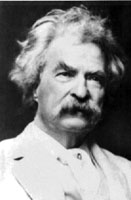The Lion having been shot by a passing hunter, the other beasts held a council to decide which of them should succeed him as King. All were agreed that the new king should be the one best fitted to rule, as excelling in the highest and most noble qualities of a ruler. But there was a trifle of difficulty in agreeing which quality best befitted a monarch.
Archives for 4 January 2010
English as she is spoke
Academic, n. One who, lacking the gift of natural stupidity, has attained stupidity by degrees.
‘Advice to a Young Actor’, by Mark Twain
YOUNG ACTOR. — This gentleman writes as follows: “I am desperate. Will you tell me how I can possibly please the newspaper critics? I have labored conscientiously to achieve this, ever since I made my début upon the stage, and I have never yet entirely succeeded in a single instance. [Read more…]
‘Fenimore Cooper’s Literary Offences’, by Mark Twain
Originally published in the North American Review, July, 1895.
“The Pathfinder” and “The Deerslayer” stand at the head of Cooper’s novels as artistic creations. There are others of his works which contain parts as perfect as are to be found in these, and scenes even more thrilling. Not one can be compared with either of them as a finished whole. The defects in both of these tales are comparatively slight. They were pure works of art. —Professor Lounsbury
The five tales reveal an extraordinary fullness of invention. . . . One of the very greatest characters in fiction, Natty Bumppo. . . The craft of the woodsman, the tricks of the trapper, all the delicate art of the forest were familiar to Cooper from his youth up. —Professor Matthews
Cooper is the greatest artist in the domain of romantic fiction in America. —Wilkie Collins
It seems to me that it was far from right for the Professor of English Literature at Yale, the Professor of English Literature in Columbia, and Wilkie Collins to deliver opinions on Cooper’s literature without having read some of it. It would have been much more decorous to keep silent and let persons talk who have read Cooper.
Cooper’s art has some defects. In one place in “Deerslayer,” and in the restricted space of two-thirds of a page, Cooper has scored 114 offenses against literary art out of a possible 115. It breaks the record.
There are nineteen rules governing literary art in domain of romantic fiction—some say twenty-two. In “Deerslayer,” Cooper violated eighteen of them. These eighteen require: [Read more…]








Recent Comments